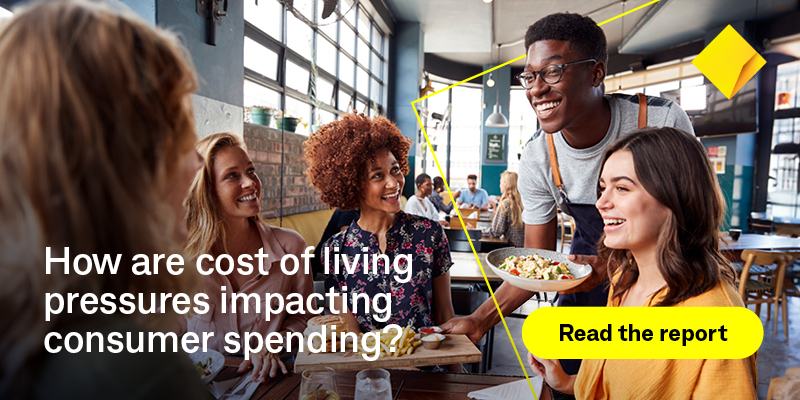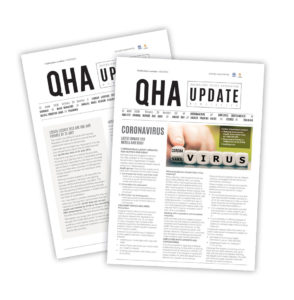By Peter Kennedy, National Manager – Hospitality, Commonwealth Bank
With higher inflation and other macroeconomic pressures, many Australian house holds are tightening their belts. They’re more cautious about their spending decisions, with many making lifestyle adjustments to compensate.
The CommBank Consumer Insights Report, confirms that many people are having fewer nights out, weighing up restaurant and fast food purchases and travel plans. While not every hospitality venue may feel the impact equally, it suggests that competition for scarcer consumer dollars is increasing.
The economic climate has ushered in a new consumer mindset. It’s one where, irrespective of their financial situation, people are more discerning about where they book and visit book and what they expect from the experience.
The research shows that while around one in four Australians don’t have enough money, or have just enough, to meet household expenses, budget-conscious behaviours are more widespread. For example, 73% of consumers use discounts, cashback offers and rewards, and 66% now spend more time researching before purchasing.
As hospitality providers adapt to new consumer habits, the report examines the aspects of the customer experience they value most. We found that perennial traits of a well-received visit, like customer service, remain vital. Most also expect providers to use technology to enhance the experience and provide flexibility throughout a purchase, particularly if it saves time and money.
Helping consumers do their homework
With most Australians spending more time researching, and searching across more than six channels, being discoverable and relevant online is now more important. After all, the first destination of choice for research is online, with search engines and websites growing in popularity.
In these earlier stages of deciding where to go, people value technologies that make their search easier and more tailored. Chief among them is search filters to align with needs or budget, which 70 of consumers say is useful. That’s followed by 53% of consumers valuing virtual information kiosks and apps to find what they need without consulting staff.
Purchasing non-negotiables and nice to haves
Certain aspects of the hospitality experience are deemed essential by consumers. Welcoming and informed staff and a good in-venue setting are the top two. Enhanced cyber security and data controls are a close third in the must-have rankings.
Digitally driven options feature frequently among purchasing imperatives. That includes overone in three saying a wide range of payment options to speed up the point of sale process is non-negotiable and almost half saying it’s nice to have.
Many patrons feel that having options for pre-arrival ordering, using QR codes to order at the table, and access to delivery services is nice to have. This suggests customers are drawn to flexibility when interacting with websites, apps and venues. Once the essentials are in place, these features offer an opportunity to boost differentiated appeal.
Demand for tech-enabled experiences, with conditions
Eight in ten consumers think hospitality providers should use technology to enhance the purchasing process and personalise the experience. Amid heightened concerns, they are also wary of sharing the data that powers it and expect venues to respect data preferences.
This includes 81% feeling hospitality businesses should be more transparent about data collection and sharing and 78% who want the ability to access, control and remove their data from databases. With 63% refusing to purchase from businesses that collect unnecessary details, responsible data capture and proving its value can make or break a sale.
People want incentives, but some are more popular
Almost three-quarters of Australians use promotional codes, cashback offers and rewards and even more exhibit deal-seeking behaviours. However, consumers prefer some incentives over others.
Free access to amenities, like parking or an airport shuttle, is most likely to be top-ranked. Offering a set menu for a more affordable experience is next. Complimentary items when booking or a discount on a second item are also valued.
Issues that bring loyalty into question
When asked if they have encountered poor experiences, 65% of hospitality consumers said they had. Bad customer service and issues with food quality are most common but vary depending on venue type.
For example, almost one in four pub and club patrons had experienced problems when splitting bills, paying tips or getting digital receipts. The nature of the problem also prompts different reactions. People are more forgiving when having difficulty making reservations, but inadequate technology is more likely to turn them away.
These are just some considerations for hospitality businesses as they respond to new needs and preferences among patrons. Our Consumer Insights Report delves into these and others, highlighting the differences between pub and club customers and other hospitality categories.
To get your copy of the report and additional insights and resources for hospitality operators, visit www.commbank.com.au/consumer-insights
Learn more about how CommBank can support your business, visit commbank.com.au/hospitality
About the CommBank Consumer Insights Report
CommBank Consumer Insights is an exclusive, wide-ranging analysis of the Australian consumer. This edition focuses on understanding consumer attitudes, motivations and expectations of their experiences amid changes to the real and digital economy.
This edition is based on an online quantitative survey conducted by Fifth Quadrant on behalf of the Commonwealth Bank. The survey was conducted in May and June2023 and was completed by 5,279 consumers of goods and services. Each respondent answered questions relating to one category where they had spent money in recent months, including:
Groceries and liquor (n=406), clothing, footwear and accessories (n=406), homewares and household appliances (n=408), consumer electronics and entertainment including books, games, music and media (n=404), recreational sporting and outdoor goods(n=407), motor vehicle parts and accessories (n=406), health and beauty products (n=406), hardware, DIY, building and garden supplies (n=407), personal care services including hairdressing, beauty and weight loss treatments(n=406), fast food and quick service restaurants (n=405), pubs and clubs(n=408), restaurants and cafes (n=407), and accommodation (n=403).
The report has been published for general information purposes only. As this information has been prepared without considering your objectives, financial situation or needs, you should, before acting on this information, consider its appropriateness to your circumstances, if necessary, seek professional advice. The Bank believes that the information in the report is correct and any opinions, conclusions or recommendations are reasonably held or made, based on the information available at the time of its compilation, but no representation or warranty, either expressed or implied, is made or provided as to accuracy, reliability or completeness of any statement made in the report. Any projections and forecasts are based on a number of assumptions and estimates and are subject to contingencies and uncertainties. Different assumptions and estimates could result in materially different results. All analysis and views of future market conditions are solely those of the Commonwealth Bank.
CommonwealthBank of Australia ABN 48 123 123 124 AFSL and Australian Credit Licence 234945



